Reason To Believe 5
Chris Knepp
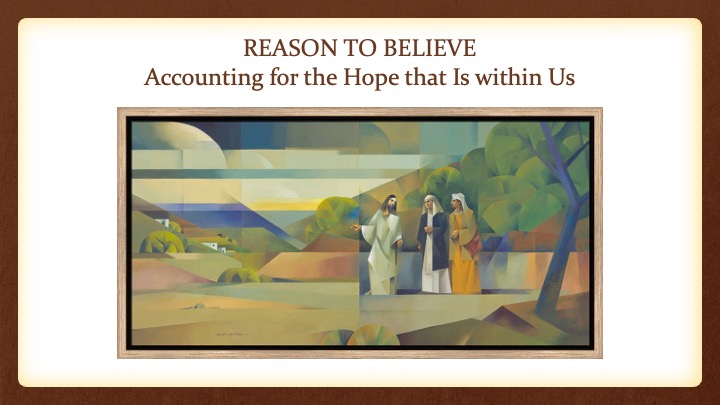
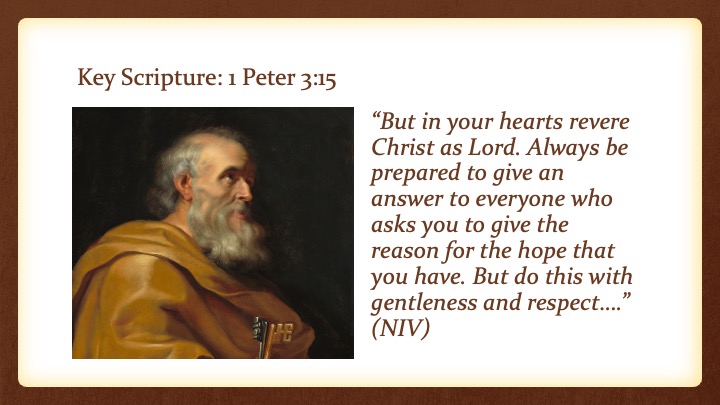
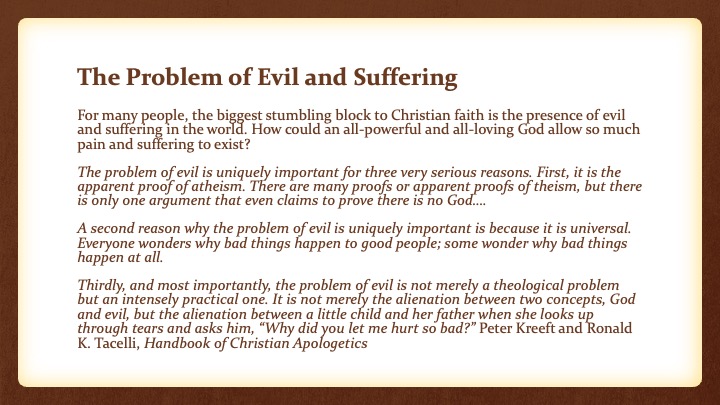
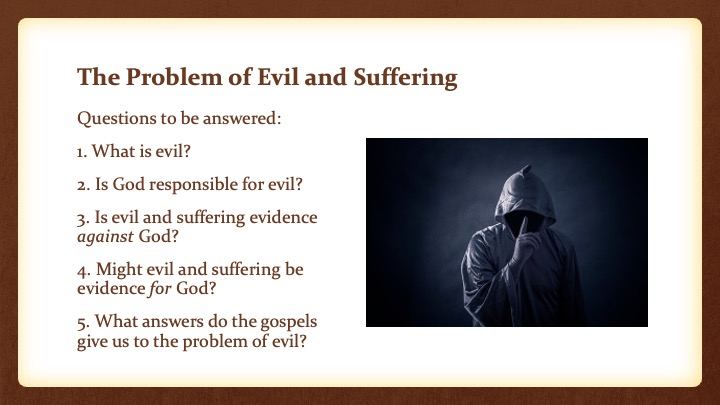
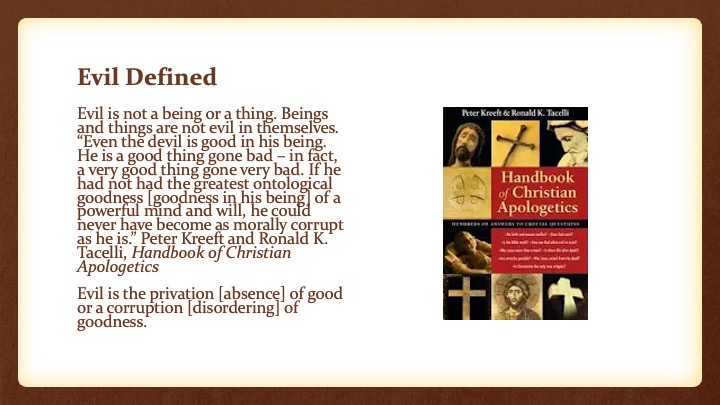
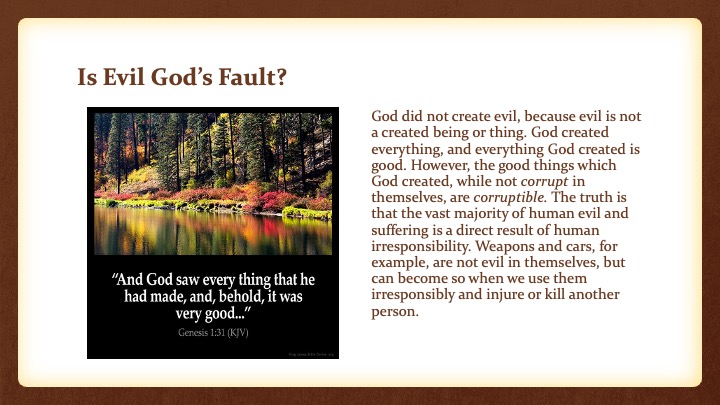
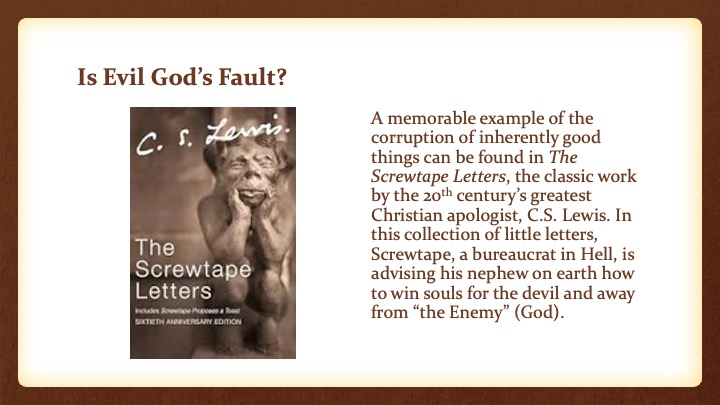
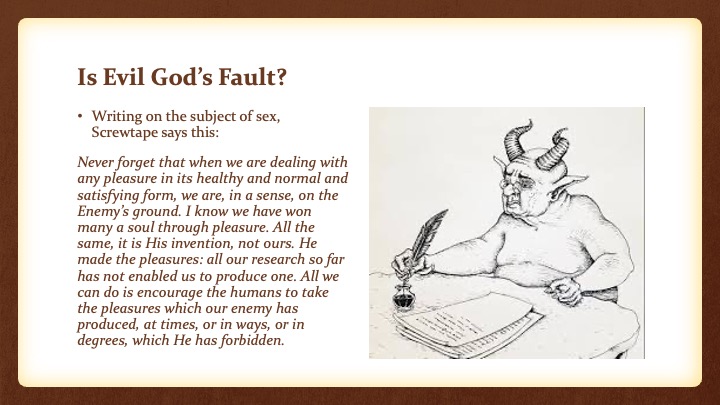
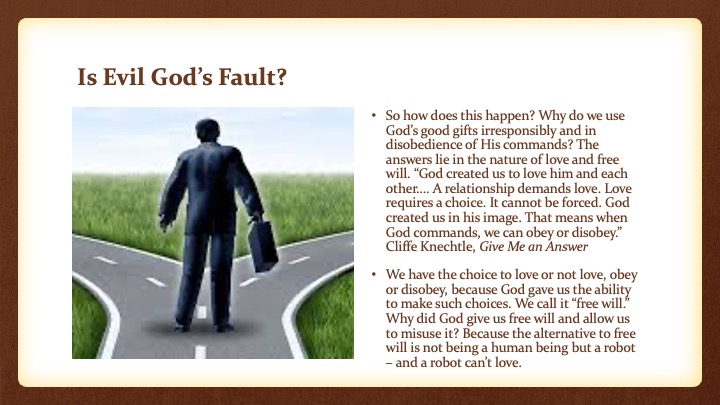
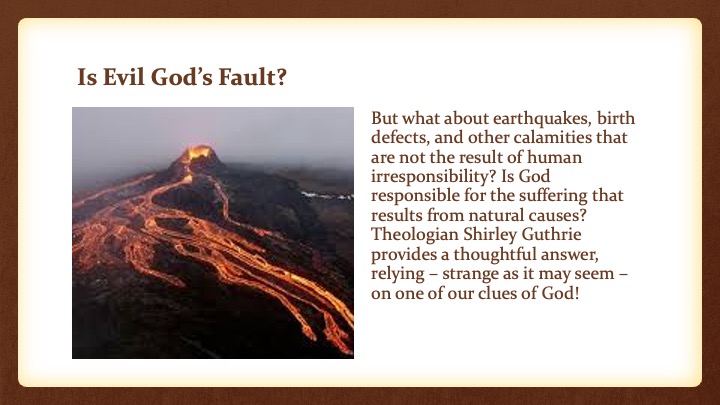
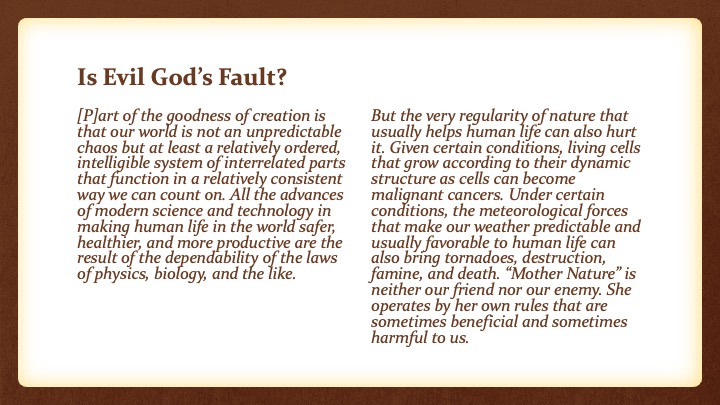
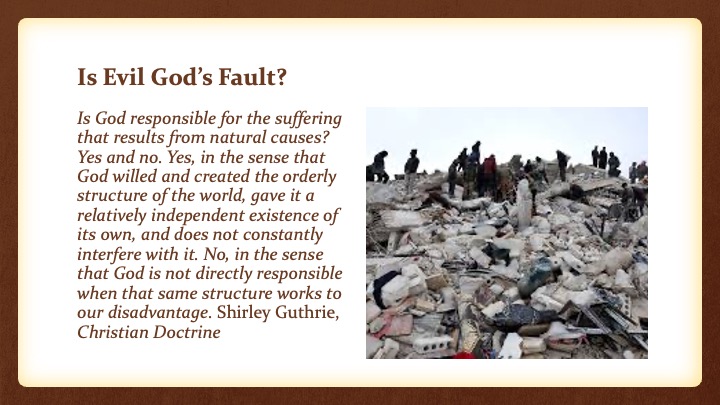
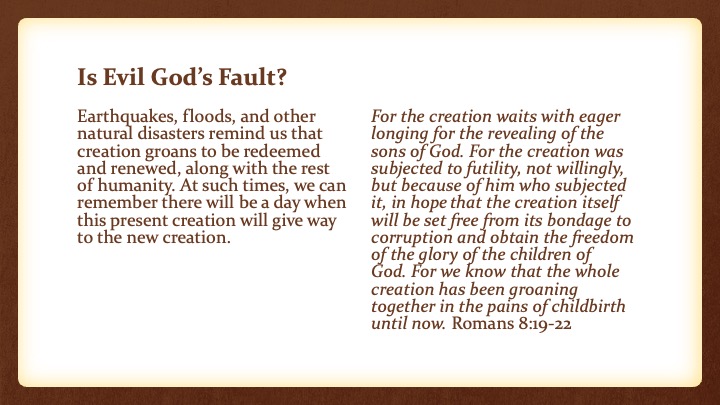
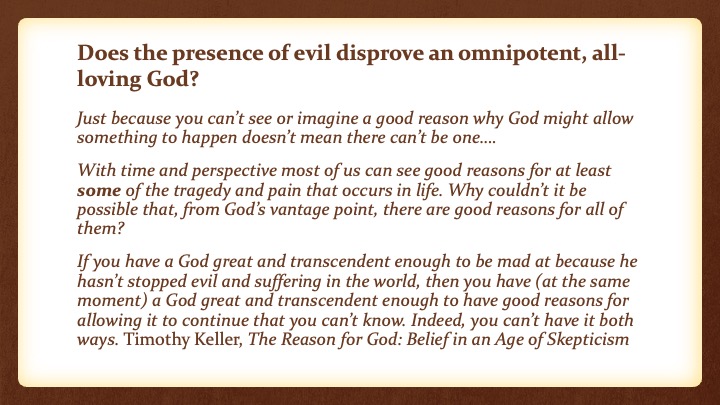
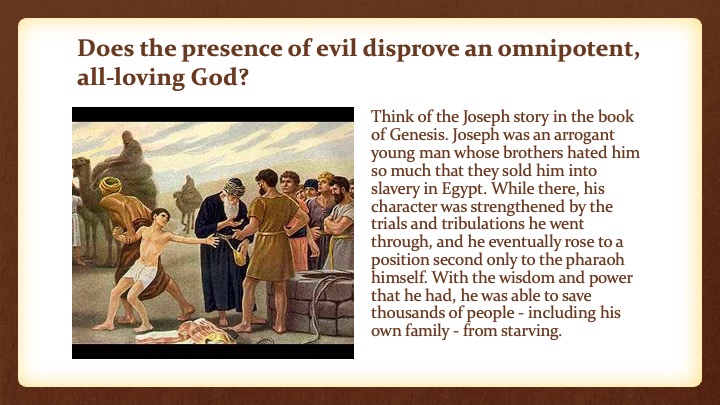
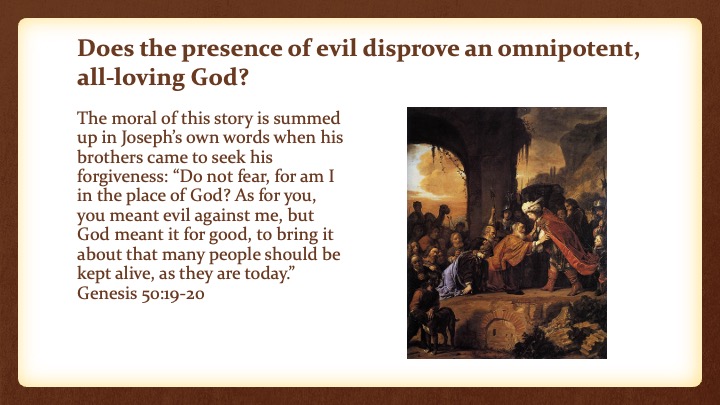
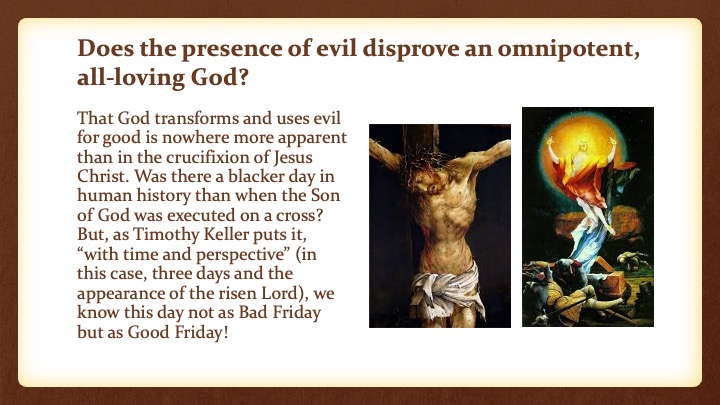
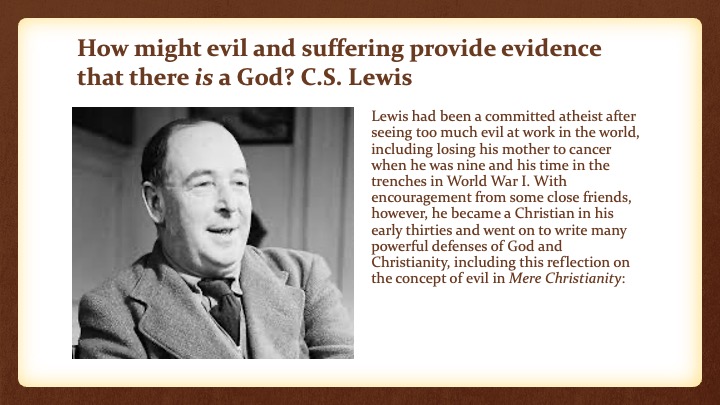
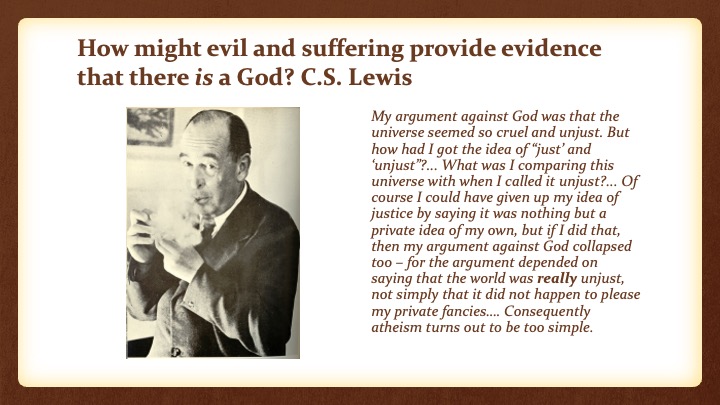
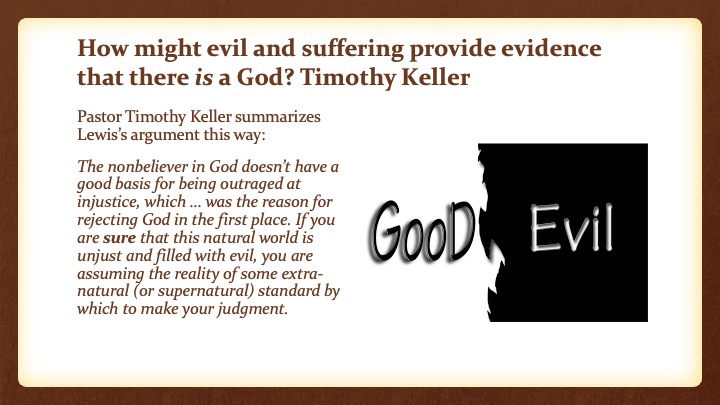
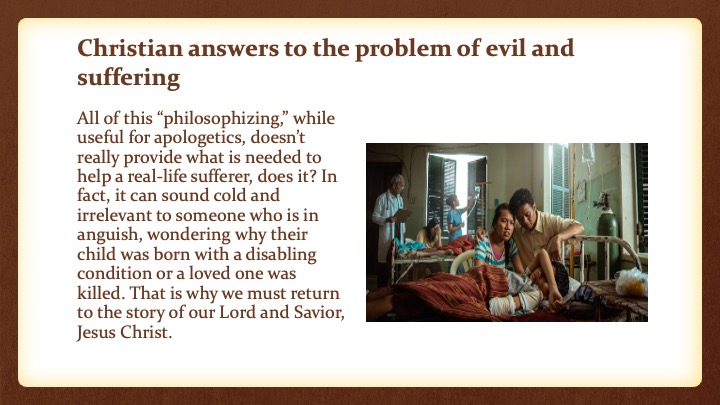
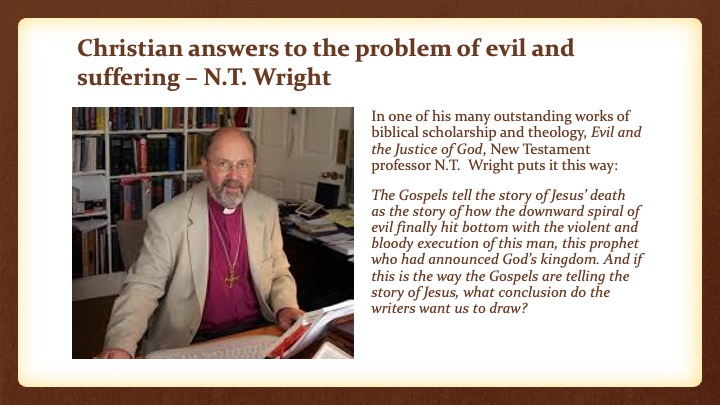
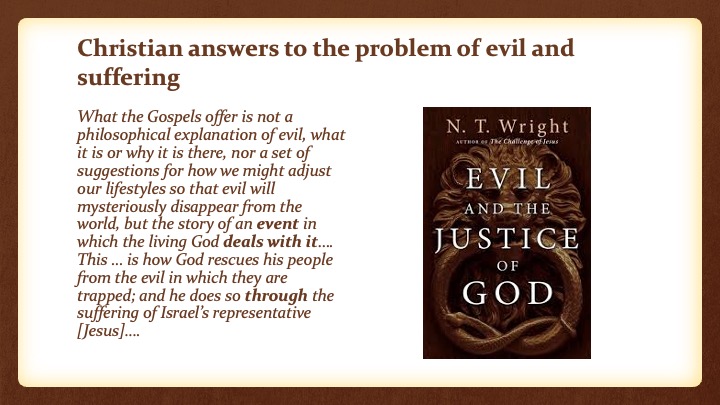
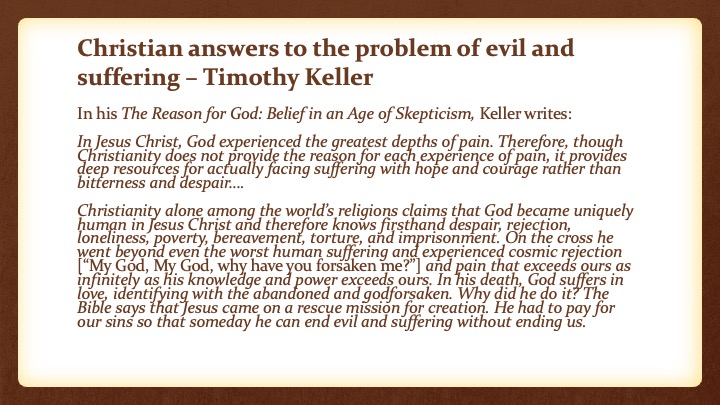
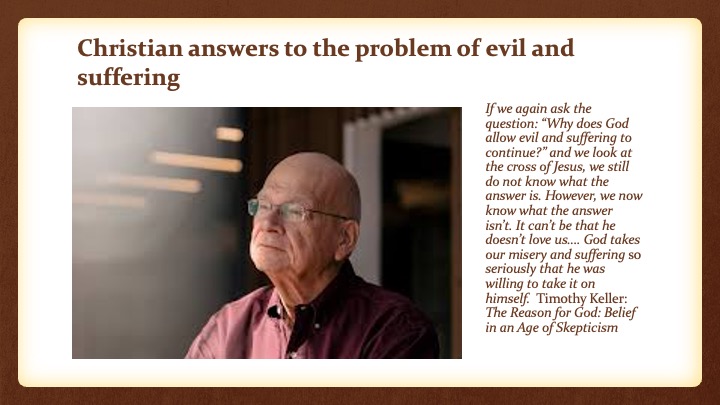
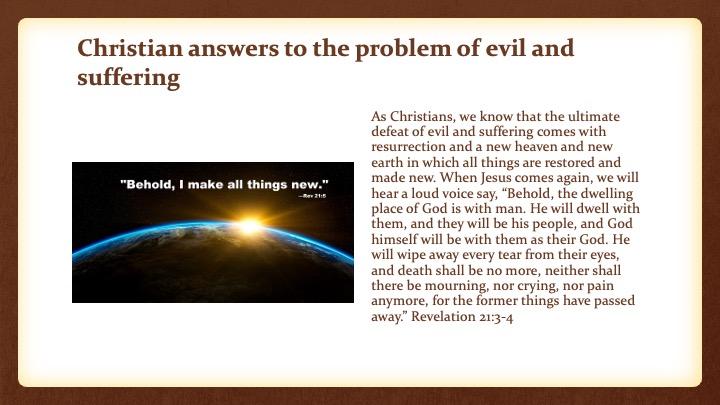
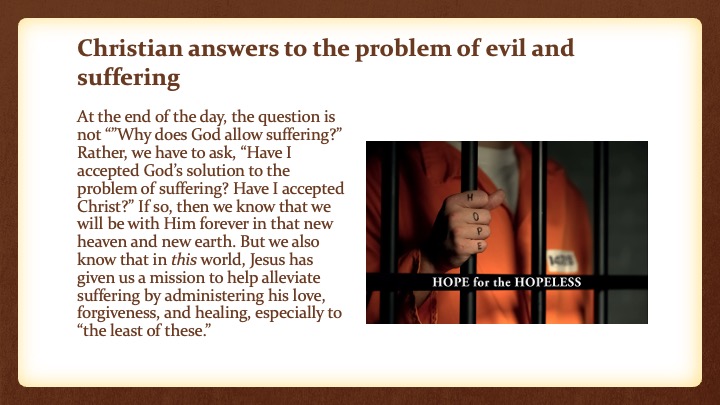
Reason To Believe
Week 5
Links
< Home Page > < Reason to Believe Menu >
Reason to Believe 5
The Text
REASON TO BELIEVE
Accounting for the Hope that Is within Us
Key Scripture: 1 Peter 3:15
“But in your hearts revere Christ as Lord. Always be prepared to give an answer to everyone who asks you to give the reason for the hope that you have. But do this with gentleness and respect….” (NIV)
The Problem of Evil and Suffering
For many people, the biggest stumbling block to Christian faith is the presence of evil and suffering in the world. How could an all-powerful and all-loving God allow so much pain and suffering to exist?
The problem of evil is uniquely important for three very serious reasons. First, it is the apparent proof of atheism. There are many proofs or apparent proofs of theism, but there is only one argument that even claims to prove there is no God….
A second reason why the problem of evil is uniquely important is because it is universal. Everyone wonders why bad things happen to good people; some wonder why bad things happen at all.
Thirdly, and most importantly, the problem of evil is not merely a theological problem but an intensely practical one. It is not merely the alienation between two concepts, God and evil, but the alienation between a little child and her father when she looks up through tears and asks him, “Why did you let me hurt so bad?” Peter Kreeft and Ronald K. Tacelli, Handbook of Christian Apologetics
Reason to Believe
Questions to be answered:
1. What is evil?
2. Is God responsible for evil?
3. Is evil and suffering evidence against God?
4. Might evil and suffering be evidence for God?
5. What answers do the gospels give us to the problem of evil?
Evil Defined
Evil is not a being or a thing. Beings and things are not evil in themselves. “Even the devil is good in his being. He is a good thing gone bad – in fact, a very good thing gone very bad. If he had not had the greatest ontological goodness [goodness in his being] of a powerful mind and will, he could never have become as morally corrupt as he is.” Peter Kreeft and Ronald K. Tacelli, Handbook of Christian Apologetics
Evil is the privation [absence] of good or a corruption [disordering] of goodness.
Is Evil God’s Fault?
God did not create evil, because evil is not a created being or thing. God created everything, and everything God created is good. However, the good things which God created, while not corrupt in themselves, are corruptible. The truth is that the vast majority of human evil and suffering is a direct result of human irresponsibility. Weapons and cars, for example, are not evil in themselves, but can become so when we use them irresponsibly and injure or kill another person.
A memorable example of the corruption of inherently good things can be found in The Screwtape Letters, the classic work by the 20th century’s greatest Christian apologist, C.S. Lewis. In this collection of little letters, Screwtape, a bureaucrat in Hell, is advising his nephew on earth how to win souls for the devil and away from “the Enemy” (God).
• Writing on the subject of sex, Screwtape says this:
Never forget that when we are dealing with any pleasure in its healthy and normal and satisfying form, we are, in a sense, on the Enemy’s ground. I know we have won many a soul through pleasure. All the same, it is His invention, not ours. He made the pleasures: all our research so far has not enabled us to produce one. All we can do is encourage the humans to take the pleasures which our enemy has produced, at times, or in ways, or in degrees, which He has forbidden.
• So how does this happen? Why do we use God’s good gifts irresponsibly and in disobedience of His commands? The answers lie in the nature of love and free will. “God created us to love him and each other…. A relationship demands love. Love requires a choice. It cannot be forced. God created us in his image. That means when God commands, we can obey or disobey.” Cliffe Knechtle, Give Me an Answer
• We have the choice to love or not love, obey or disobey, because God gave us the ability to make such choices. We call it “free will.” Why did God give us free will and allow us to misuse it? Because the alternative to free will is not being a human being but a robot – and a robot can’t love.
• But what about earthquakes, birth defects, and other calamities that are not the result of human irresponsibility? Is God responsible for the suffering that results from natural causes? Theologian Shirley Guthrie provides a thoughtful answer, relying – strange as it may seem – on one of our clues of God!
• [P]art of the goodness of creation is that our world is not an unpredictable chaos but at least a relatively ordered, intelligible system of interrelated parts that function in a relatively consistent way we can count on. All the advances of modern science and technology in making human life in the world safer, healthier, and more productive are the result of the dependability of the laws of physics, biology, and the like.
• But the very regularity of nature that usually helps human life can also hurt it. Given certain conditions, living cells that grow according to their dynamic structure as cells can become malignant cancers. Under certain conditions, the meteorological forces that make our weather predictable and usually favorable to human life can also bring tornadoes, destruction, famine, and death. “Mother Nature” is neither our friend nor our enemy. She operates by her own rules that are sometimes beneficial and sometimes harmful to us.
• Is God responsible for the suffering that results from natural causes? Yes and no. Yes, in the sense that God willed and created the orderly structure of the world, gave it a relatively independent existence of its own, and does not constantly interfere with it. No, in the sense that God is not directly responsible when that same structure works to our disadvantage. Shirley Guthrie, Christian Doctrine
• Earthquakes, floods, and other natural disasters remind us that creation groans to be redeemed and renewed, along with the rest of humanity. At such times, we can remember there will be a day when this present creation will give way to the new creation.
• For the creation waits with eager longing for the revealing of the sons of God. For the creation was subjected to futility, not willingly, but because of him who subjected it, in hope that the creation itself will be set free from its bondage to corruption and obtain the freedom of the glory of the children of God. For we know that the whole creation has been groaning together in the pains of childbirth until now. Romans 8:19-22
Reason to Believe
Does the presence of evil disprove an omnipotent, all-loving God?
Just because you can’t see or imagine a good reason why God might allow something to happen doesn’t mean there can’t be one….
With time and perspective most of us can see good reasons for at least some of the tragedy and pain that occurs in life. Why couldn’t it be possible that, from God’s vantage point, there are good reasons for all of them?
If you have a God great and transcendent enough to be mad at because he hasn’t stopped evil and suffering in the world, then you have (at the same moment) a God great and transcendent enough to have good reasons for allowing it to continue that you can’t know. Indeed, you can’t have it both ways. Timothy Keller, The Reason for God: Belief in an Age of Skepticism
Think of the Joseph story in the book of Genesis. Joseph was an arrogant young man whose brothers hated him so much that they sold him into slavery in Egypt. While there, his character was strengthened by the trials and tribulations he went through, and he eventually rose to a position second only to the pharaoh himself. With the wisdom and power that he had, he was able to save thousands of people - including his own family - from starving.
The moral of this story is summed up in Joseph’s own words when his brothers came to seek his forgiveness: “Do not fear, for am I in the place of God? As for you, you meant evil against me, but God meant it for good, to bring it about that many people should be kept alive, as they are today.” Genesis 50:19-20
That God transforms and uses evil for good is nowhere more apparent than in the crucifixion of Jesus Christ. Was there a blacker day in human history than when the Son of God was executed on a cross? But, as Timothy Keller puts it, “with time and perspective” (in this case, three days and the appearance of the risen Lord), we know this day not as Bad Friday but as Good Friday!
Reason to Believe
How might evil and suffering provide evidence that there is a God? C.S. Lewis
Lewis had been a committed atheist after seeing too much evil at work in the world, including losing his mother to cancer when he was nine and his time in the trenches in World War I. With encouragement from some close friends, however, he became a Christian in his early thirties and went on to write many powerful defenses of God and Christianity, including this reflection on the concept of evil in Mere Christianity:
My argument against God was that the universe seemed so cruel and unjust. But how had I got the idea of “just’ and ‘unjust”?... What was I comparing this universe with when I called it unjust?... Of course I could have given up my idea of justice by saying it was nothing but a private idea of my own, but if I did that, then my argument against God collapsed too – for the argument depended on saying that the world was really unjust, not simply that it did not happen to please my private fancies…. Consequently atheism turns out to be too simple.
Reason to Believe
How might evil and suffering provide evidence that there is a God? Timothy Keller
Pastor Timothy Keller summarizes Lewis’s argument this way:
The nonbeliever in God doesn’t have a good basis for being outraged at injustice, which … was the reason for rejecting God in the first place. If you are sure that this natural world is unjust and filled with evil, you are assuming the reality of some extra-natural (or supernatural) standard by which to make your judgment.
Christian answers to the problem of evil and suffering
All of this “philosophizing,” while useful for apologetics, doesn’t really provide what is needed to help a real-life sufferer, does it? In fact, it can sound cold and irrelevant to someone who is in anguish, wondering why their child was born with a disabling condition or a loved one was killed. That is why we must return to the story of our Lord and Savior, Jesus Christ.
Reason to Believe
Christian answers to the problem of evil and suffering – N.T. Wright
In one of his many outstanding works of biblical scholarship and theology, Evil and the Justice of God, New Testament professor N.T. Wright puts it this way:
The Gospels tell the story of Jesus’ death as the story of how the downward spiral of evil finally hit bottom with the violent and bloody execution of this man, this prophet who had announced God’s kingdom. And if this is the way the Gospels are telling the story of Jesus, what conclusion do the writers want us to draw?
What the Gospels offer is not a philosophical explanation of evil, what it is or why it is there, nor a set of suggestions for how we might adjust our lifestyles so that evil will mysteriously disappear from the world, but the story of an event in which the living God deals with it…. This … is how God rescues his people from the evil in which they are trapped; and he does so through the suffering of Israel’s representative [Jesus]….
Reason to Believe
Christian answers to the problem of evil and suffering – Timothy Keller
In his The Reason for God: Belief in an Age of Skepticism, Keller writes:
In Jesus Christ, God experienced the greatest depths of pain. Therefore, though Christianity does not provide the reason for each experience of pain, it provides deep resources for actually facing suffering with hope and courage rather than bitterness and despair….
Christianity alone among the world’s religions claims that God became uniquely human in Jesus Christ and therefore knows firsthand despair, rejection, loneliness, poverty, bereavement, torture, and imprisonment. On the cross he went beyond even the worst human suffering and experienced cosmic rejection [“My God, My God, why have you forsaken me?”] and pain that exceeds ours as infinitely as his knowledge and power exceeds ours. In his death, God suffers in love, identifying with the abandoned and godforsaken. Why did he do it? The Bible says that Jesus came on a rescue mission for creation. He had to pay for our sins so that someday he can end evil and suffering without ending us.
If we again ask the question: “Why does God allow evil and suffering to continue?” and we look at the cross of Jesus, we still do not know what the answer is. However, we now know what the answer isn’t. It can’t be that he doesn’t love us…. God takes our misery and suffering so seriously that he was willing to take it on himself. Timothy Keller: The Reason for God: Belief in an Age of Skepticism
As Christians, we know that the ultimate defeat of evil and suffering comes with resurrection and a new heaven and new earth in which all things are restored and made new. When Jesus comes again, we will hear a loud voice say, “Behold, the dwelling place of God is with man. He will dwell with them, and they will be his people, and God himself will be with them as their God. He will wipe away every tear from their eyes, and death shall be no more, neither shall there be mourning, nor crying, nor pain anymore, for the former things have passed away.” Revelation 21:3-4
Reason to Believe
At the end of the day, the question is not “”Why does God allow suffering?” Rather, we have to ask, “Have I accepted God’s solution to the problem of suffering? Have I accepted Christ?” If so, then we know that we will be with Him forever in that new heaven and new earth. But we also know that in this world, Jesus has given us a mission to help alleviate suffering by administering his love, forgiveness, and healing, especially to “the least of these.”